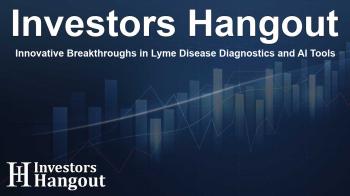Innovative Breakthroughs in Lyme Disease Diagnostics and AI Tools

AI Innovations in Lyme Disease Testing
At a recent major scientific meeting, experts unveiled an exciting blood test refined through artificial intelligence (AI) aimed at improving the identification of Lyme disease. This advancement offers a promising solution to the significant challenges faced in the early detection of this growing health concern. Lyme disease, spread through tick bites, is becoming more common in various regions due to climate change. The conventional testing method, known to miss diagnoses in a high percentage of cases, has left many patients vulnerable to long-term health effects.
Potential Impact on Patient Outcomes
Over the years, the prevalence of Lyme disease continues to rise, with hundreds of thousands diagnosed each year. Unfortunately, current testing methods only deliver accurate early diagnoses 30% of the time. If these tests miss the infection during the initial stages, patients often end up battling severe and long-lasting symptoms. The newly developed AI-enhanced test raises the chances of accurate detection to over 90%. This breakthrough could transform treatment approaches, ensuring patients receive timely and effective interventions.
Mechanism of the New Test
Utilizing research on the immune response of rhesus macaque monkeys, the team has formulated a test analyzing a comprehensive set of proteins to identify the infection accurately. This innovative single-test approach is a marked improvement over the traditional two-tier method, which often requires multiple tests. By incorporating machine learning, researchers can now detect distinctive immune responses, enhancing the diagnostic process.
Expected Availability of the Test
The research team anticipates that this promising test will be available to healthcare professionals in the near future, potentially by the end of 2026. With costs projected to be affordable and compatibility with existing laboratory equipment, this test could significantly change the landscape of Lyme disease diagnostics.
AI as a Resource for Adolescent Health
In another exciting development presented at the conference, a customized AI model designed for addressing adolescent health questions showcased its potential as an exceptional informational resource. Dubbed Medicine-GPT, this tool was created to help youths who may feel uncomfortable discussing health issues with adults. The study indicated that Medicine-GPT outperformed other models in providing complete, accurate health information.
Understanding Adolescent Health Needs
Considering that young people often seek information online for their health, having a reliable AI companion significantly aids them in understanding complex medical topics. User feedback has revealed a demand for clarity and context in answers given by AI tools. There is an urgency to ensure these AI resources not only deliver medically accurate information but also do so in a manner that resonates with adolescents’ needs.
Guidance for Responsible AI Use
While the capabilities of AI tools like Medicine-GPT are astonishing, experts stress the importance of using them judiciously. They appeal to healthcare providers to guide teenagers on how to effectively and responsibly utilize these technologies. The goal is not just to inform, but to support young individuals as they navigate health-related queries.
Engaging in Future Dialogues at ADLM 2025
With ADLM 2025 focused on pivotal issues concerning healthcare and technology integration, attendees are presented with the opportunity to dive deeper into these groundbreaking topics. The event is designed to foster collaboration and knowledge-sharing among a diverse range of professionals aimed at improving health outcomes globally.
Showcasing Future Innovations
As the conference progresses, key discussions will cover advancements ranging from artificial intelligence to personalized medicine. Presentations will be available to professionals interested in the latest contributing factors in diagnostics and laboratory medicine, ultimately working towards a healthier future.
Frequently Asked Questions
What is introduced in the new Lyme disease test?
An AI-enhanced blood test has been developed to improve early diagnosis of Lyme disease, boasting over 90% accuracy.
How will the new test benefit patients?
The test allows for earlier and more accurate treatment, significantly lowering the risk of chronic illness resulting from delayed diagnosis.
What is Medicine-GPT?
Medicine-GPT is an AI tool tailored to assist adolescents in obtaining information about health and medical inquiries.
How does Medicine-GPT differ from ChatGPT-4?
It shows superior performance in completeness and reasoning for adolescent health inquiries compared to ChatGPT-4.
What are the future implications of these innovations?
These advancements highlight the vital role of AI in enhancing diagnostic capabilities and providing informed health management for individuals, especially the youth.
About The Author
Contact Thomas Cooper privately here. Or send an email with ATTN: Thomas Cooper as the subject to contact@investorshangout.com.
About Investors Hangout
Investors Hangout is a leading online stock forum for financial discussion and learning, offering a wide range of free tools and resources. It draws in traders of all levels, who exchange market knowledge, investigate trading tactics, and keep an eye on industry developments in real time. Featuring financial articles, stock message boards, quotes, charts, company profiles, and live news updates. Through cooperative learning and a wealth of informational resources, it helps users from novices creating their first portfolios to experts honing their techniques. Join Investors Hangout today: https://investorshangout.com/
The content of this article is based on factual, publicly available information and does not represent legal, financial, or investment advice. Investors Hangout does not offer financial advice, and the author is not a licensed financial advisor. Consult a qualified advisor before making any financial or investment decisions based on this article. This article should not be considered advice to purchase, sell, or hold any securities or other investments. If any of the material provided here is inaccurate, please contact us for corrections.

